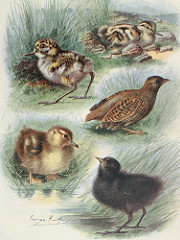|
Home
|
Feb 8, 2019
This week’s themeWords made with combining forms This week’s words mycology ailurophile orogeny epigeal nidifugous 
Nidifugous Nestlings
Britain’s Birds and Their Nests (1910) Illustration: George Rankin Image: Internet Archive This week’s comments AWADmail 867 Next week’s theme Words that aren’t what they appear to be A.Word.A.Day
with Anu Gargnidifugous
PRONUNCIATION:
MEANING:
adjective: Well-developed and able to leave the nest soon after hatching.
ETYMOLOGY:
From Latin nidi- (nest) + -fugous (fleeing). Ultimately from the
Indo-European root sed- (to sit), which is also the source of nest,
sit, chair, saddle, assess, sediment, soot, cathedral, and
tetrahedron. Earliest documented use: 1902.
NOTES:
The opposite of nidifugous is nidicolous (remaining with parents
for a long time after birth).
Etymologically speaking, these words apply to birds, but there’s no reason
you can’t use them elsewhere. For example, if your adult child suggests living in your basement, you could simply say, “Don’t be nidicolous!”
USAGE:
“The young of all species are -- as you well know -- nidifugous, and ours
will be no exception. And as they go, they will take some of their spirit
with them, leaving us, the founders as mere husks.” Malcolm Macdonald; Strange Music; Severn House; 2012. See more usage examples of nidifugous in Vocabulary.com’s dictionary. A THOUGHT FOR TODAY:
In order that people may be happy in their work, these three things are
needed: they must be fit for it; they must not do too much of it; and they
must have a sense of success in it. -John Ruskin, author, art critic, and
social reformer (8 Feb 1819-1900)
|
|
Subscriber Services
Awards | Stats | Links | Privacy Policy
Contribute | Advertise
Awards | Stats | Links | Privacy Policy
Contribute | Advertise
© 1994-2026 Wordsmith